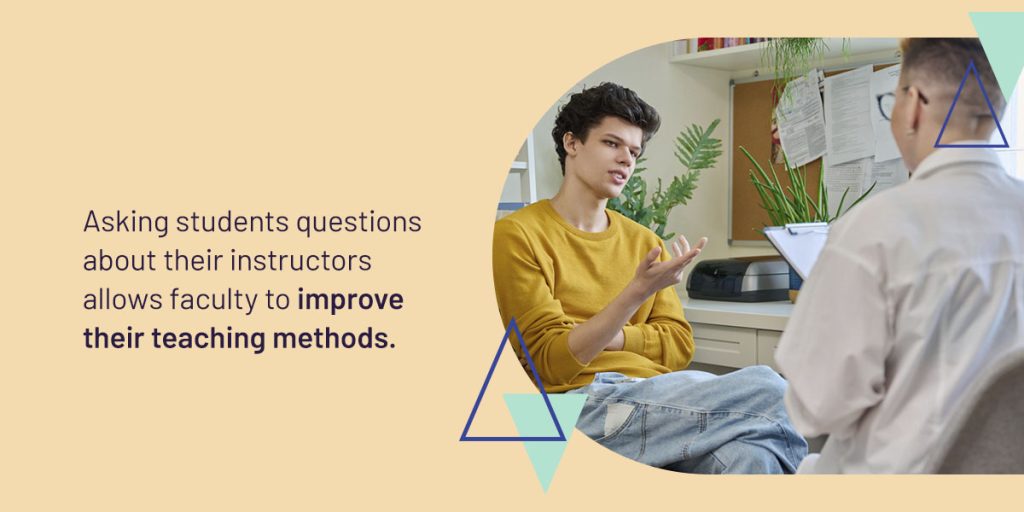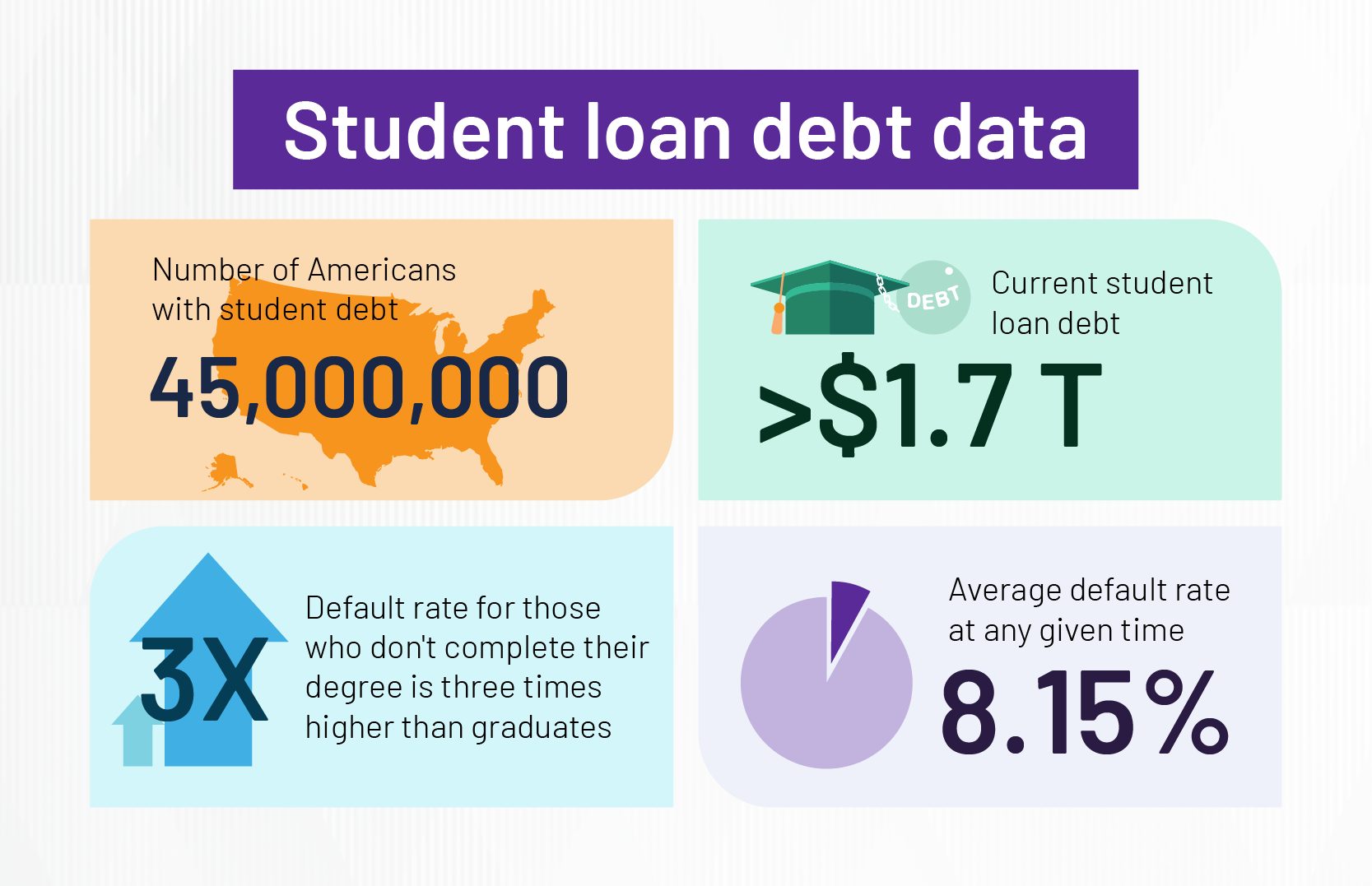
Course evaluation surveys areone of the simplest ways your institution can improve student retention and performance. They allow you to gather insightful student feedback about course content and teaching methods. Using this information, you can better understand the student experience and make more impactful decisions to improve it.
However, course evaluations are only as useful as the questions within them. Before creating your institution’s evaluation surveys, read over the examples in this guide. We’ve also included advice on survey timing, customization, and question types to help you create effective, actionable course evaluation surveys.
What do good survey questions achieve?
Question quality can make or break your survey results. But what exactly does a good question look like?
Questions are usually better when they are specific, concise, and easy to understand. They also follow a logical order to make it easier for respondents to answer. Spending extra time to ensure your survey contains high-quality questions is worthwhile as it can result in:
- Relevant responses: Unclear questions are easily misinterpreted, resulting in off-topic, unusable responses. Conversely, good questions ensure student responses contain information pertinent to the question topic. A survey full of clear questions will give you valuable responses that are easier to sort and analyze.
- Thoughtful responses: Survey fatigue is a phenomenon that causes respondents to lose interest in a survey. It’s caused by complex, confusing questions and overwhelmingly long surveys. When students feel survey fatigue, they might give inaccurate and short responses. Including fewer, clear questions can keep students engaged throughout the survey, resulting in more thoughtful, honest answers.
- Higher response rate: Survey fatigue can also cause respondents to give up on the survey entirely and feel reluctant to complete future surveys. When your surveys are quick and easy to answer, you’ll find that students are more willing to complete them. Making surveys easily accessible and addressing concerns raised in responses can also improve response rates.
- Effective decision-making: A good survey will get you a large pool of relevant, thoughtful responses that give you a deeper understanding of what a course is like for students. By analyzing these responses, you can identify areas that need the most improvement and make worthwhile changes that students appreciate.
Examples of effective course evaluation questions
If you need some inspiration for your institution’s course evaluation surveys, read through the examples below. We’ve included some general questions and more specific ones related to teaching, course content, and self-evaluation. Include about 15 questions in your survey so it’s quick to complete, and focus on only asking questions about things you need feedback on the most.
1. General survey questions
General questions can apply to courses in any field or area of study and provide insight into how useful and relevant students feel the courses are. Here are some examples of general course survey evaluation questions:
- How would you rate your overall experience of the course?
- Did the course content meet your expectations?
- How likely are you to recommend this course to a friend/colleague?
- How did this course help you develop professionally?
- What will you do differently now that you’ve completed the course?
- What did you like most/least about the course?
2. Instructor-related questions

Asking students questions about their instructors allows faculty to improve their teaching methods. Feedback about teaching quality is also an essential metric to include in faculty performance reviews. Here are some sample questions related to the instructor and their performance:
- How knowledgeable was the instructor?
- How clearly did the instructor explain the course material?
- How would you rate the instructor’s mastery of the material?
- How easy was it to approach the instructor with questions or concerns?
- How well did the instructor answer your questions?
- Did the instructor present the course material too fast, too slow, or just right?
3. Course-related questions
In addition to questions regarding the professor, course evaluation surveys should include inquiries about the course. However effective an instructor might be, course material, design, and structure are just as important. Course-related prompts for evaluation might include:
- The course material was well-suited to the level of the class.
- The course assignments and lectures corresponded with the course content.
- The course’s organization was helpful and sensible.
- Throughout this course, I feel I’ve learned a lot about the subject matter.
- The course followed the syllabus.
- The learning materials were relevant and valuable.
4. Student self-evaluation questions
Consider including course evaluation questions for students to measure their commitment to the course, too. These responses can help you determine the credibility of the survey-taker and how much value to place on their response. For example, feedback from a student who regularly attends class may be more valuable for assessing teaching effectiveness than from a student who rarely attends class.
Here are a few questions to ask regarding student self-evaluation:
- How many classes or sessions did you attend?
- Did you complete all reading assignments for this course?
- How many hours per week did you spend on this course?
- How would you describe the level of effort you put into this course?
- Was this a course you wanted to take?
- What grade would you give yourself for this course?
5. Teaching assistant-related questions
If one or more teaching assistants (TAs) aid with instruction, grading, or other tasks, it’s necessary to ask some evaluation questions about them. Answers to these questions help institutions determine how well their TA programs work for students. The data could also help professors choose the best TAs for their courses.
Examples of teaching assistant-related questions include:
- The TA returned assignments and exams with thorough and helpful feedback.
- The TA was able and willing to explain evaluations of my work.
- The TA was adequately knowledgeable and prepared.
- The TA promoted communication and discussion.
- I was comfortable asking my TA questions about the course material.
- The TA always arrived at class on time.
- The TA was available outside of class time.
What could Watermark do for your institution?
Should each department have different course evaluation questions?
Courses in different departments have different objectives, methods, and purposes. For example, the teaching methods and content in an art course will differ significantly from those in a science course. That’s why it’s beneficial for courses in separate departments to have different course evaluation questions. You can tailor questions around the course material, structure, and teaching methods to make it more relevant.
With that said, course evaluation questionnaires should have some similarities across departments. Whether a course revolves around creating pottery or understanding biological chemistry, all courses in higher education have a few objectives in common. In all courses, instructors need to present information clearly, help students understand course material, and return assignments with helpful feedback. In addition, all courses should follow their syllabi, have an organized flow, and include relevant content and assignments.
General questions about instructors, courses, students, and TAs will give your institution the tools to measure basic standards across departments. When designing course evaluation surveys, it’s a good idea to include both general and department-specific questions.
Examples of department-specific course evaluation questions
Your institution’s course evaluation surveys can all follow a similar format and include common questions, but you should add course-specific questions to gather more relevant feedback. Here are examples of questions you can ask for art, science, and business courses to give you an idea of how to customize them:
1. Questions for arts courses
Courses in the arts help students improve specific artistic skill sets and allow them to create original work. Here are some of the questions you might ask students following an arts course:
- The course helped me learn to present ideas in an artistic medium.
- The course helped me develop my creative skills.
- The course gave me the opportunity to create original creative work.
- The instructor treated me and my work with respect.
- The instructor challenged me to develop my individual artistic expression.
- The instructor clearly articulated the standards of performance.
2. Questions for science courses
Courses in the sciences are unique for several reasons, and their surveys should reflect that. Science courses often involve labs, out-of-classroom experiences, and report writing. Some questionsthat are relevant to science courses can include:
- The laboratory classes helped me understand the lecture material.
- The laboratory classes complemented the lectures.
- The instructor used fair and standard methods for evaluating lab reports.
- Good-quality equipment was always available to me.
- I had adequate training to use equipment and tools in the laboratory.
- The instructor followed lab safety protocols during this course.
3. Questions for business courses
Business courses have objectives unique from arts and science courses. These courses help build an understanding of financial, legal, ethical, operational, and administrative business-related concerns. Their course evaluation questions might include the following:
- The course helped me recognize concepts relevant to business ethics and responsibilities.
- The course developed my ability to use quantitative and qualitative tools.
- The course helped me develop my communication skills in written and verbal format.
- The course helped me apply key business concepts to real-world scenarios.
- The instructor was knowledgeable about current business trends and best practices.
- Industry guest speakers were inspiring and relevant to the course.
Deciding on the timing of course evaluation surveys
Another important factor to consider when conducting course evaluation surveys is timing. While end-of-course survey questions are useful, you might also want to establish mid-course evaluation questions. These questions will help you gauge how students respond to a course while in the midst of assignments and instruction, as they may feel differently from the middle to the end of the course.
Mid-course survey evaluation questions can include:
- I am sufficiently prepared for upcoming assessments.
- The course is on track with the syllabus.
- I am able to keep up with the course assignments.
- The course content is engaging and interesting.
- The course pacing is manageable.
Vary question types for course surveys to uncover deeper insights
Surveys should include multiple question types to limit survey fatigue and offer a range of feedback. The two main questions types to consider include:
Close-ended questions
Good course survey evaluation questions may sometimes not be questions at all. You might phrase them as statements with an accompanying Likert scale to show how much a student agrees with the statement. An example of a Likert scale question might be, “I enjoyed this course and the material I learned in it.” The student can answer by choosing one option from the following:
- Strongly agree
- Agree
- Neither agree nor disagree
- Disagree
- Strongly disagree
The Likert scale is helpful because it shows the intensity of the survey-taker’s feelings regarding the subject. Regardless of how many points are on the scale, symmetry is important — neutrality should be the centermost option. Other examples of close-ended questions include yes or no questions and multiple choice.
Open-ended questions
Your surveys should also give students a chance to answer some open-ended questions. These questions allow students to elaborate on their answers or express concerns not addressed in other questions. Some sample open-ended questions might include:
- What did you like most about this course?
- What improvements would you suggest for this course?
- What advice would you offer this course instructor?
- What advice would you give to a student considering this course?
Streamline course evaluation surveys with Watermark
















































































































































































































































































































































































































